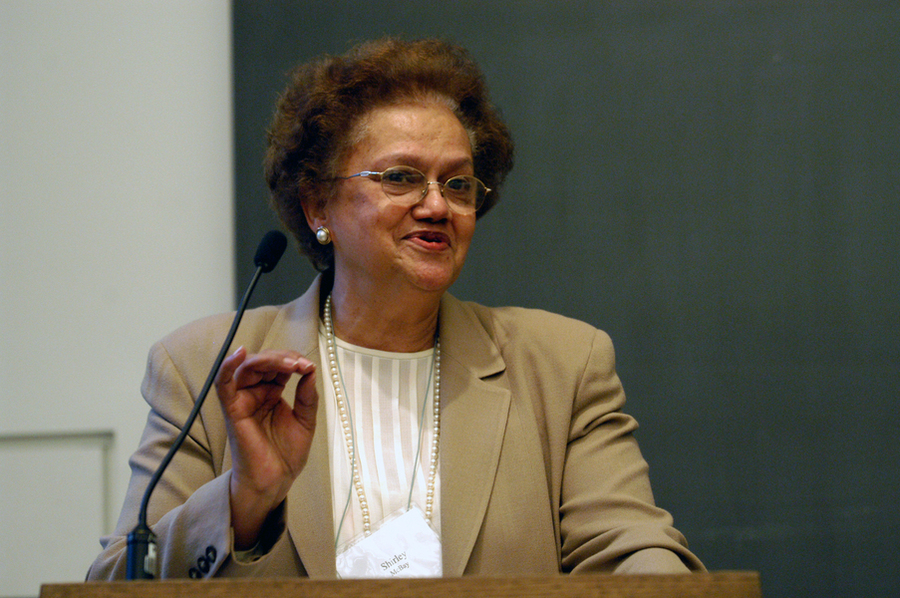Shirley McBay, former dean of student affairs and PKG Center co-founder, dies at 86
In 1988, Shirley McBay, trailblazing mathematician and dean of student affairs, co-founded the MIT Public Service Center (now the Priscilla King Gray Public Service Center ‘PKG Center’) along with First Lady Priscilla King Gray and Professor Robert Mann ‘50. An MIT visionary, she recognized that, although public service activities were widespread across the Institute, MIT needed a central resource to support and expand such efforts. True to the Institute’s culture of innovation and leadership, MIT’s center was one of the first established in the U.S. The PKG Center is profoundly grateful for Dean McBay’s leadership and mourns the loss of a fantastic advocate and change-maker. Shirley’s legacy was recently featured in the MIT News.

Shirley McBay, the first Black dean of student affairs at MIT, died at her home in Los Angeles on Nov. 27. She was 86.
As the Institute’s dean of student affairs from 1980 to 1990, McBay led efforts to identify and address obstacles in the Institute’s racial environment that hindered the success of students from underrepresented or underserved communities. A 1986 report entitled “The Racial Climate on the MIT Campus” was produced under her direction, and recommendations from that report led to another important initiative she directed, the Quality Education for Minorities (QEM) project.
“Dr. McBay’s commitment to removing barriers to success, providing an excellent education for all students, and encouraging students to see their stake in the world and to pay it forward are hallmarks of her contributions to the MIT community,” says Chancellor Melissa Nobles. “We are indebted to and inspired by her.”
Kenneth Manning, the Thomas Meloy Professor of Rhetoric and of the History of Science, says McBay’s fight for racial justice and women’s rights at MIT is “legendary.”
“The largely forgotten Racial Climate Report that she produced in the mid-’80s should be required reading today at MIT and elsewhere for anyone seriously trying to achieve diversity, equity, and inclusion at their institution,” says Manning. “The work was pioneering nationwide, and in many ways ahead of its time.”
While at MIT, McBay told a Congressional panel that in science and engineering, “the worst intellectual crime one can commit is to prejudice one’s results, to prejudge how something will turn out. However, this is precisely what we are doing when we fail — from elementary school to graduate school — to encourage women and minorities to enter the fields of science and engineering.”
McBay also helped found the MIT Public Service Center, now known as the PKG Center after Priscilla King Gray, wife of the former MIT president Paul Gray. Priscilla Gray says McBay conceived of the idea for the center, which has served as a central resource for student involvement in community service projects.
“She really established the MIT Public Service Center,” Gray says. “She got it started and when she was leaving MIT, she asked if I would help, if I could look after it when she left. It was a good partnership.”
Gray says what most impressed her about McBay was “her interest in the students and getting things done that would benefit them. She was very much a person with great ideas, and she saw them through.”
Born in Bainbridge, Georgia, McBay attended segregated schools, where she showed great promise, especially in math. In the book “Technology and the Dream,” a series of oral histories from Black students, faculty, and staff at MIT, McBay told author Clarence Williams about how she competed in math as a fourth-grader against high-school students, standing on a chair so she could write her problems on the chalkboard.
“I enjoyed it immensely,” she told Williams, who is a professor emeritus in MIT’s Department of Urban Studies and Planning and the founder of the MIT Black History project. “I was never short on confidence.”
That early confidence stuck with her — and helped her to fight hard for racial justice.
Williams, who worked closely with McBay during the 1980s, says she “frequently compelled individuals and groups to confront their own attitudes, behavior, and personal history” around issues of race in higher education.
“She was relentless when it came to discussing and examining these issues,” he says.
To continue reading this article on MIT News, click here. To read Shirley McBain’s obituary in the New York Times, click here.
Tags: Anti-Racism, PKG Center History, Racial Justice, Tech for Good
